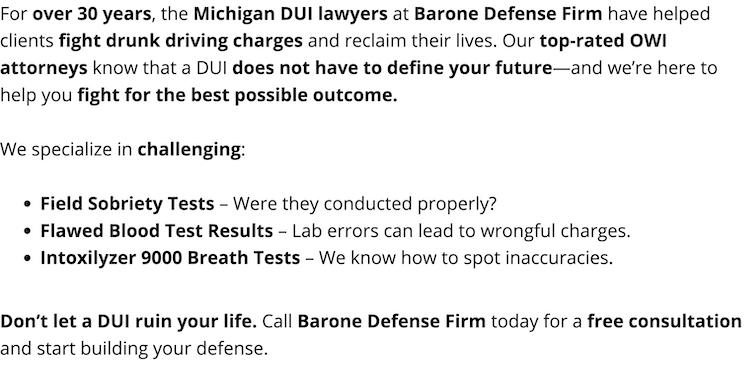Types of DUI Trials
In Michigan, there are two main types of trials: bench trials and jury trials. While you are probably familiar with a jury trial, you may not know what a bench trial is or how the two differ.
The main distinction between these two types of trials is that in a jury trial, a jury composed of six or 12 people (depending on the type of case) acts as the fact-finder, while in a bench trial, the judge acts as the fact-finder.
As the prosecution and the defense present their cases, the jury or judge must make decisions with regard to the facts of the case. Some of the relevant facts in a drunk driving case include:
- Whether or not the driver was intoxicated
- Whether or not the chemical breath or blood test is reliable
- Whether or not the police officer is telling the truth with regard to the traffic stop, investigation, and arrest
The Michigan DUI cases are typically heard in a district court. Most Michigan DUI cases, also known as OWIs, are misdemeanors, and therefore heard in Michigan's district court level. District courts are smaller subsets of the overall court structure, generally, they are community or small county courts.
Jury Trial
Ultimately, the jury members must decide whether these facts point to the innocence or guilt of the defendant. Drunk driving cases are almost always tried before a jury. The reason for that is that many of the judges are going to side with the prosecutor and the police officers. It is difficult in many cases to sway a judge and have them believe something other than what the numbers on the machine say.
Generally speaking, it is almost always better to have a jury trial in a drunk driving case for a number of reasons. First, the six-person jury in a misdemeanor case and the 12-member jury in felony cases are meant to act as a safeguard for the defendant. In jury trials, all jury members must deliberate on the facts and agree to the ultimate verdict; in a bench trial, on the other hand, the fate of the defendant rests with just one person.
For the most part, the attorney and defendant want to make sure that the jury is capable of having an emotional response when it comes down to a drunk driving defense and making sure that they understand that they could be in the same position as a person being accused.
Bench Trial
In a bench trial, however, there is no jury. The judge acts as both the keeper of the law and the fact-finder of the case being heard. In specific cases, a judge can be essential to having a successful drunk driving defense success, especially if the judge tends to be open minded. A local attorney might have an understanding of what judges are more open-minded and may result in a better outcome. Similarly, bench trials are important whenever there is a certain factual circumstance where maybe a jury member might have some kind of bias or convict on an emotional basis.
In cases where there is injury or death involved, judges might have a more logical approach as opposed to an emotional response, this is especially important in cases involving death or injury. This would be a consideration as to why somebody would want what they call bench or judge-based trial.
Length of a Case
The average drunk driving case is supposed to be completed within 77 days in the Michigan courtroom. However, in practice, the average drunk driving case can stay between three and six months from the beginning of the case in the court system. However, that being said, any kind of drug case or case that has blood can take sometimes upwards of even a year to be filed.
DUI Trial vs. Plea Bargain: How to Decide
Every case is different, which is why some clients have better outcomes at trial while others come out ahead with a plea bargain. The benefits of going to trial include:
- Potential for an acquittal
- Potential for a lesser sentence if you're convicted
- Ability to appeal the results
- Opportunity to use various legal strategies
However, the disadvantages of going to trial can include:
- Lengthy, drawn-out process
- Potentially higher costs to pay for the longer defense
- Risk of a severe sentence that's harsher than one you could negotiate
- Emotional stress of facing court and dealing with public scrutiny
If you want to avoid those potential disadvantages, you might prefer a plea deal. Benefits of that route include:
- Ability to negotiate for a lesser sentence
- More control over whether you accept a deal
- Shorter resolution time
- Cost savings by avoiding court
- Less stress without a court appearance
The possible disadvantages of a plea deal include:
- Admitting you're guilty
- Facing a sentence, even if it's a lesser one, when you could have been acquitted at trial
- Not having much opportunity for an appeal or to change your mind
Going to court might be a good option if you have a strong defense and lots of evidence that could dispute the charges. This call is best made with the assistance of an experienced DUI attorney. They can review your case and weigh the possible outcomes to advise you on the best option.
How Barone Defense Firm Prepares for DUI Trials
The attorneys at Barone Defense Firm have extensive experience with plea deals and DUI trials. They start with an in-depth case review to understand all aspects of your case. Using the evidence allows them to create a customized defense strategy. Motion practice is also used to prepare for the actual trial.
While our attorneys come prepared with arguments, they also use experts to help with the defense. These experts might call into question issues such as your blood alcohol level or how the police officers acted during your arrest. Expert witnesses can help pick apart the prosecution's case.
Finally, your Barone attorney creates a tailored defense strategy based on all the information available. That includes knowledge about the specific courtroom and judge you're facing.
How Barone Defense Firm Can Defend Your Rights
Barone Defense Firm looks for any flaws in the procedures that led to your arrest. That might include challenging the test results, procedures for the field sobriety tests, or the conduct of the police officers. They may also try to get your charges dismissed before you reach court or negotiate on your behalf if a plea deal is the best move. In court, they represent you throughout the trial, ensuring you have adequate representation.
 Barone Defense Firm Home
Barone Defense Firm Home
















